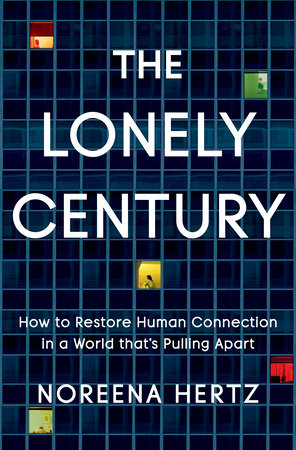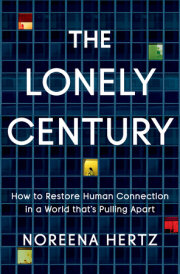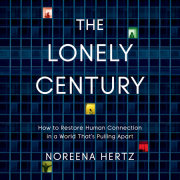Chapter 1This Is the Lonely CenturyCurled up against him, my chest pressing against his back, our breathing synchronized, our feet intertwined. This is how we have slept for over five thousand nights.
But now we sleep in different rooms. By day we dance the two-meter zigzag. Hugs, caresses, kisses, our daily shorthand, now forbidden, “Stay away from me” my new term of endearment. Constantly coughing, feeling achy and unwell, I am terrified that if I get too close to my husband I will infect him. So I keep my distance.
This is March 31, 2020, and along with 2.5 billion other people, a third of the world’s population, my household is in lockdown.
With so many people stuck at home, condemned to working remotely (if one still has a job, that is), not allowed to visit friends or loved ones, getting outside once a day if at all, “socially distancing,” “quarantining,” and “self-isolating,” it is inevitable that feelings of loneliness and isolation have soared.
Yet the Lonely Century did not begin in the first quarter of 2020. By the time the pandemic struck, many of us had
already been feeling lonely, isolated, and atomized for a considerable amount of time.
Why we became so lonely and what we must do to reconnect are what this book is about.
Pretty in PinkSeptember 24, 2019. I am waiting, seated at the window, my back against the pretty-in-pink wall.
My phone pings. It’s Brittany—she’s running a few minutes late.
“No worries,” I message back. “Cool choice of place.” And it is. The effortlessly beautiful, gazellelike clientele, with their fashion-model portfolios under their arms, hint at just how hip Cha Cha Matcha in Manhattan’s NoHo district feels.
A few beats later, she arrives. Long-limbed, athletic, she scans the room, her smile widening as I come into her gaze. “Hey, love your dress,” she says.
For forty dollars an hour, I’d expect no less. For Brittany is the “friend” I have rented for the afternoon from a company called RentAFriend. Founded by New Jersey entrepreneur Scott Rosenbaum, who had seen the concept take off in Japan, and now operating in dozens of countries around the world, the company offers over 620,000 platonic friends for hire online.
This wasn’t the career path Brittany, a twenty-three-year-old small-town Floridian, had intended when she won her place at Brown. Yet, having been unable to secure a job in environmental science (the subject she majored in at university) and anxious about her levels of student debt, she explains her decision to rent out her company as a pragmatic one, her emotional labor as just another monetizable string to her bow. When she’s not renting herself out—on average she does so a few times a week—she helps start-ups with their social media postings and offers executive assistant services via TaskRabbit.
Before we met up I was pretty nervous, not sure if friend was covert speak for sexual partner, or even if I’d recognize her from her profile picture. But within minutes I feel reassured that this is friends-without-benefits territory. And over the next few hours, as we wander around downtown Manhattan chatting about #MeToo, her heroine Ruth Bader Ginsburg, and, at McNally Jackson, our favorite books, at times I even forget I am paying for Brittany’s company. Although she doesn’t feel like an old friend, she does feel like a fun new prospect.
But it is at Urban Outfitters on Broadway that she really ramps up the charm, just as the meter on our encounter begins to run out. Smile now perma-fixed, banter upped, she joshes with me as we rummage through a pile of T-shirts and gamely joins me in trying on Crayola-colored bucket hats. Apparently they really suit me. Although presumably she would tell me that whether it was true or not.
I ask Brittany about the others who’ve hired her, my fellow friendship-consumers. She tells me of the soft-spoken woman who didn’t want to show up at a party alone; the techie from Delhi who had moved to Manhattan for work, didn’t know anyone in town, and wanted company at dinner; the banker who offered to come over with chicken soup when she was sick. If you had to sum up your typical clientele, what would you say, I ask her. Her answer: “Lonely, thirty-to-forty-year-old professionals. The kind of people who work long hours and don’t seem to have time to make many friends.”
It’s a sign of our times that today I can order companionship as easily as I can a cheeseburger with just a few taps on my phone, that what I call a Loneliness Economy has emerged to support—and in some cases exploit—those who feel alone. But in the twenty-first century, the loneliest century we have known, Brittany’s overworked professionals are not the only ones suffering; the tentacles of loneliness reach much further.
Even before the pandemic triggered a “social recession” with its toxification of face-to-face contact, three in five U.S. adults considered themselves lonely.
In Europe, it was a similar story. In Germany, two-thirds of the population believed loneliness to be a serious problem. Almost a third of Dutch nationals admitted to being lonely, one in ten severely so. In Sweden, up to a quarter of the population said that they were frequently lonely. In Switzerland, two out of every five people reported sometimes, often, or always feeling so.
In the United Kingdom, the problem had become so significant that in 2018 the prime minister went so far as to appoint a Minister for Loneliness. One in eight Brits did not have even a single close friend they could rely on, up from one in ten just five years before. The data for Asia, Australia, South America, and Africa was similarly troubling.
Inevitably, months of lockdowns, self-isolation, and social distancing have made this problem even worse.
Young and old, male and female, single and married, rich and poor. All over the world people are feeling lonely, disconnected, and alienated. We are in the midst of a global loneliness crisis. None of us, anywhere, is immune.
This isn’t just a mental health crisis. It’s a crisis that’s making us physically ill. The research shows that loneliness is worse for our health than not exercising, as harmful as being an alcoholic, and twice as harmful as being obese. Statistically, loneliness is equivalent to smoking fifteen cigarettes a day. Crucially, this is regardless of what we earn, our gender, age, or nationality.
It’s also an economic crisis. Even prior to the pandemic in the United States, social isolation was estimated to cost Medicare nearly $7 billion every year, more than it spends on arthritis and almost as much as it does on high blood pressure—and that’s just among elderly people. Meanwhile, U.K. employers were losing £800 million ($994 million) each year due to loneliness-related sick days, significantly more when productivity losses were also taken into account.
And it’s a political crisis too, fueling divisiveness and extremism in the United States, Europe, and across the globe. Loneliness and right-wing populism are, as we will see, close bedfellows.
This state of affairs didn’t just happen by chance. Nor did it emerge overnight.
The way we now live, the changing nature of work, the changing nature of relationships, the way our cities are now built and our offices designed, the way we treat each other and the way our government treats us, our smartphone addiction, and even the way we now love are
all contributing to how lonely we have become.
The purpose of this book isn’t solely to articulate the scale of the loneliness crisis in the twenty-first century, how we got here, and the ways that it will get worse if we do nothing to respond. It is also a call for action. To governments and business, for sure—loneliness has clear structural drivers that they must address. But also to each of us as individuals.
Because society isn’t only done to us, we “do” society too, we participate in it and shape it. So if we want to stop the destructive path of loneliness and restore the sense of community and cohesion we have lost, we will need to acknowledge that there are steps we must take, as well as tradeoffs we will have to make—between individualism and collectivism, between self-interest and societal good, between anonymity and familiarity, between convenience and caring, between what is right for the self and what is best for the community, between liberty and fraternity.
The recognition that each of us has a critical role to play in mitigating the loneliness crisis is central to this book. Reconnecting society cannot only be a top-down initiative driven by governments, institutions, and big business, even if the process of disconnecting society largely was.
So throughout the book I will be including ideas, thoughts, and examples of what we can do to counter the current trajectory of divisiveness, isolation, and loneliness, not only on a political and economic level but on a personal one as well.
This is the Lonely Century, but it doesn’t have to be so.
The future is in our hands.
Copyright © 2020 by Noreena Hertz. All rights reserved. No part of this excerpt may be reproduced or reprinted without permission in writing from the publisher.










